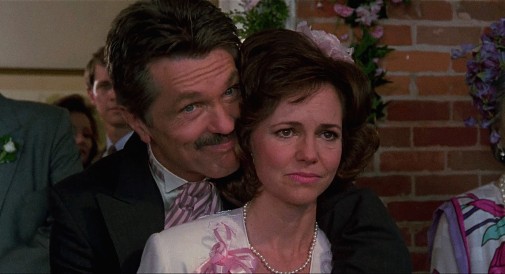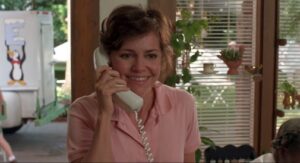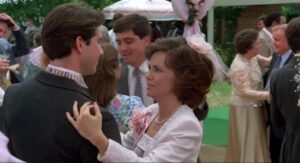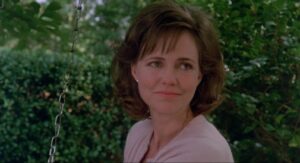
Almost There: Sally Field in “Steel Magnolias”
As Pride Month 2022 draws to a close, the appetite for frothy camp classic entertainment remains unchanged and unlikely ever to die. Some, if not most, of the films to achieve such status aren’t even tangentially queer-themed, gaining their iconic status through other means. Such is the case of Herbert Ross’ film adaptation of Steel Magnolias. Written for the stage by Robert Harling, this southern dramedy is a blush and bashful delight, originally sold as the funniest movie to make you cry. Despite a famous locker room scene with plenty of hunks on display, the flick’s queer fandom can be attributed to its cavalcade of divas, from fresh-faced Julia Roberts to the cantankerous marvel of Shirley MacLaine’s Ouiser.
Though Roberts was the only performer to get any Academy love, she’s far from the picture’s acting MVP. That honor falls on Sally Field, who might have come close to a third Oscar nod for her work as M’Lynn…

Steel Magnolias opens on the day of Shelby Eatenton’s wedding. She’s M’Lynn’s daughter, a bright young woman with type 1 diabetes and a character arc bound to provoke tears and awards nominations. That being said, the bride enters the film in brattish fashion, complaining about her nail polish’s indelicate shade of pink while the matriarch runs around trying to prepare everything for her baby girl’s special day. Checking on the crystals – the champagne glasses are all broken! – and listening to Shelby while her unruly boys pour ice down her back, Field’s M’Lynn is a vision of motherly perseverance, a heroic figure trying to keep her cool in the eye of the storm.
Field may not sound authentic when negotiating the molasses flavor of her put-upon Southern accent, but she’s less of a spectacle than Roberts’ curiously unconvincing transformation. In any case, the audience is too busy watching the actress play with the manic uncertainty beneath the stalwart façade to care about the accent work. The mother of the bride archetype has rarely been better embodied than by Field here, fielding her brood’s antics while she phones someone about the shattered glass. As impatience bubbles over, her voice cracks and reveals the stress while the insistent smiles and bright eyes gain a manic quality.

Introducing us to her character, Field foregrounds comedy, setting a light-hearted prelude to the movie’s first tear-jerking moment. The inklings of that tone shift happen as Shelby’s talking about growing old with her husband, the picture cutting to her mama’s apprehensive face. Then, in silence and rest, sitting on the beautician’s chair and not having to tighten the reigns of her blustering household, a quiet panic settles over Mrs. M’Lynn. Throughout Steel Magnolias, this shall be Field’s primary strategy, punctuating the comedy with an undercurrent of sorrow. It’s subtext, at first, but it’ll steadily come to the top.Amid the jolly salon environment, Shelby turns tense, the camera approaching and the soundtrack muffling itself with tinnitus strings. The bride’s having a hypoglycemic attack, and it’s up to the older women to save her from demise. One could play this scene with demonstrative emotion, surrendering to the acute drama. Sally Field, however, prioritizes motherly support, a sense of stability, and assurance. The ruckus isn’t about M’Lynn, so the actress works on illuminating how these things are a part of the woman’s quotidian, something she’s accustomed to and knows how to handle. She’s worried, maybe even panicking, but she’s in control. She has to be.Later, when everybody’s dancing at the reception, Field has another opportunity to assert her protagonist status in the ensemble work. Confronting her daughter’s husband, M’Lynn pleads and melts in a paroxysm of maternal worry. Field is utterly earnest here. Crowned with brunette curls shaped like a football helmet, she chooses a path of sincerity over thornier possibilities. It’s a moving dialogue, for sure, but I find myself admiring her background reactions even more. Notice the shadow of uncertainty, the sting of loss, as M’Lynn watches Shelby drive away as a newly married woman – a whisper of heartbreak complicating the picture.

Easter pastels give way to Christmas-time crimson and gold, lives go on, and Shelby has news for her mother. Against doctor’s advice and to M’Lynn’s horror, she’s pregnant. And so, the cold panic of the salon episode returns, but, this time, there’s no stalwart support to temper the dark sentiment. Instead, Field lets the worry curdle into seething fury at her child’s reckless disregard for her own well-being, her limits. Shelby accuses her mamma of being fed up because she’s no longer in control, blinded by youthful insolence. And yet, as much as Field acts up M’Lynn’s anger, the source of it is always clear – sadness and fear. Not being able to boss her sprog around is never a baseline for the woman’s displeasure, not in this performance.Mayhap a more daring actress would
